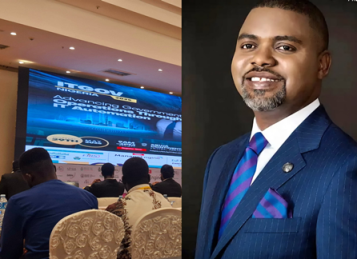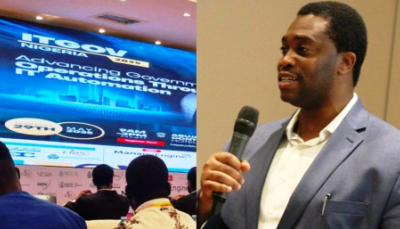Nigeria needs more broadband users than internet users
Chief Executive Officer of Internet Solutions, Mr. OLUSOLA TENIOL, IT Edge News ANTHONY NWOSU and MOSHOOD ABUBAKAR why broadband is still not affordable in Nigeria and how Big Data, Cloud Computing and LTE will do to Nigeria data space when finally launched.
How will you rate mobile internet and broadband penetration in Nigeria, what is your company offering Nigerians in terms of broadband?
As a part of the Dimension Data Group, we are basically about the services that speak to the demand side and this is essentially data. We are also about creating solutions on the internet. As you know, mobile and voice is big. It’s the biggest contributor to ICT’s contribution to Gross Domestic Product of Nigeria, which stands at about 7%, that is if you go by the latest national statistics. What have we to offer? We are all about creating different types of broadband and internet solutions. We are about services, the services that speak to the demand side. As you may be aware, the internet isn’t as prevalent and definitely not as robust as voice in Nigeria. There is a huge body of evidence to prove that the number of Facebook and Twitter users has quadrupled here in Nigeria and that is colossal. This is a pointer to the latent demand side of data. We would like to see an era where we have local content prevalent here in Nigeria. We are also looking at the area that concerns the last mile. We design lower layers of broadband infrastructure MPLS-VPN, which is a key component of moving data in an efficient manner. We are also involved in the supply and installation of high content IP traffic equipment that functions as an enabler to broadband that can allow enterprises and firms understand their networks in a cost effective manner. So in addition to the above, we provide data centre services, and this is the bedrock of cloud computing. This is an area that speaks to our intent in this market. We are engaged in local restructure, data centers, data recovery and backup solutions.
In terms of content, what is Internet Solution offering in the area of spread and speed. Are we looking at 4G LTE solutions here in Nigeria?
You know the beauty of Nigeria is that we don’t have a legacy system to worry so much about. This means, this doesn’t act as a barrier to leapfrogging other nation’s current technologies and accelerates the broadband revolution in Nigeria. For example, you mentioned 4G, that’s a new technology. In Africa, the predominate data services are two that are operational – 2.5G (GPRS) is a GSM based system, which is slow and 3G which is very expensive but not so prevalent. As a mobile broadband technology, LTE is proven to be the best and it addresses the minimum bandwidth download speed as stipulated in the Nigerian broadband plan. LTE is prominent as a last mile broadband solution but not only that we have Fiber to the x (FTTx). Not everyone needs to be an LTE provider here. Where we play is Big Data, it’s about massive amounts of data in the order of terabytes and petabytes. This is about network management, data collaboration, consumer information and integration. We partner with others in the eco-system that provides FTTx last mile solutions. The underlying technology enables this to be possible.
Big data and cloud computing are the next big thing, what are the security challenges?
Big data have certain challenges. Cloud computing is complex and it is not easy. It aggregates resources that you and I would have to purchase from a business point of view and entrusting it to a cloud to manage the data and the infrastructure on our behalf. What are the risks? There are risks of hacking, data intrusion, and security compromises and data integrity. These are the biggest issues that are being addressed in big data. Those that are entrusted with the data have to make sure that the data is safe. There are different multiple jurisdictions that guide and try and assist in this challenge. If it’s in banking, the regulation should reside with CBN to handle the big data challenges and enforce the laws and if it’s in telecoms then Consumer Rights and NCC should ensure that data that is in the cloud isn’t compromised. In my own opinion, I think the data should reside locally, due to data sovereignty issues. There should be local hosting mandated, not allowing foreign countries to handle Nigeria’s data, this is also very important for national security reasons.
Broadband affordability takes over the last CTO events, why si broadband still unaffordable here in Nigeria?
If you take a look at some other countries in the west and look at the propensity to spend, yes broadband isn’t affordable here in Nigeria. It’s stated that we have about 48 million internet users, but that doesn’t translate to broadband users. If we, for example, in Nigeria, use the benchmark of 1.5Mbps download speed, then most people do not have access to this download speed at any given time, that means that they are internet users but if you or most people have access to this 1.5Mbps download speed then you are effectively broadband users. There is a difference between broadband users and internet users. This we should understand. If you have people browsing with phone or have access to the internet via cyber cafes and the speed of the internet isn’t up to the stipulated broadband speed of 1.5Mbps, then that user is to be categorized as an internet user not a broadband user. If you segment and look at the real users and coverage of broadband, we have about 800,000 broadband, at 1 million users of broadband internet users. This is what Broadband National Policy speaks to. This is not about voice; this is about changing and transforming the way we do things, whether it’s related to the area of medicine, business models or most importantly the way we learn. We need a minimum speed to do this. We need more of broadband users than internet users. Affordability of broadband is vital. We do not have a pricing benchmark here in Nigeria. These are things we should be addressing. Creating demand of broadband is another thing from affordability.
How do we drive broadband demand?
Compared to other environments, the demand isn’t there yet. In the broadband ecosystem, the higher the demand the lower the price and that is how it works. The issue of affordability is as much driven by early adopters and early majority users, which means broadband usage is highly concentrated in the cities. Government should invest in last mile solutions to ensure that there is high penetration and demand for broadband. The government can lay infrastructure in the village, and then put in subsidies in the first few years. This will enable primary and secondary school students access e-learning facilities. But what happens when these years pass? There must be a way to ensure that broadband is part and parcel of our lives. There should be education and advocacy for the usage of broadband.
To move internet to the hinterlands, why don’t internet service providers go into Hotspots Solutions?
These days most gadgets are Wifi enabled. The center of control of communication is controlled by mobile network operators. Yes, this model can be applied but some telcos might see it as a threat to their business model. There should be an understanding between Wifi and Hotspot operators and telcos. The secondary issue of Wifi hotspots is limited coverage constrained by the distance. Wifi hotspots are only good in densely populated areas. For it to be commercially viable, it might be a challenge when trying to address areas that are sparsely populated. That is the technological limitation of Wifi hotspots. However, it will work in highly populated areas.
What are the basic challenges of broadband deployment in Nigeria? Is it regulatory framework or human capacity?
There must be a blueprint to define so many things like universal access, policy framework, political will, regulatory environment etc. These must be in place and everyone must buy into it. Without this, there will be total chaos. There must also be state and local governments support. This means that ICT should be a critical national infrastructure as it is in Namibia. Take for instance, incessant cutting of fiber and the effects it has on network QoS. These cuts are being caused by road construction work. There should be awareness and coordination in infrastructure development to prevent this from recurring. As broadband infrastructure is only an enabler, Nigeria has a lot to offer in terms of our huge population and human capacity, the issue is that most of the leaders are not tech savvy and don’t understand the importance of broadband. The treatment of double taxation is one such example of the areas that should be handled by our leaders to ensure that we build a nation for future generations of Nigerians that will expect an e-Nigeria ecosystem.




























